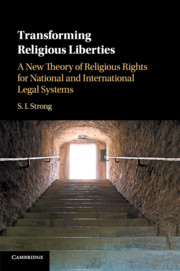
- Publisher:
- Cambridge University Press
- Online publication date:
- October 2017
- Print publication year:
- 2017
- Online ISBN:
- 9781316832097
- Subjects:
- Law, Human Rights, Comparative Law

Religious liberties are at the centre of many debates on how liberal democratic societies can accommodate diversity. This book considers the interaction between law and religion from a broad international, comparative and jurisprudential perspective and proposes a new theoretical approach to religious liberty that both transcends and transforms current approaches to religious rights. Not only does the discussion draw on the work of a range of legal and political philosophers including John Rawls, Ronald Dworkin and John Finnis, it also tests the validity of the various proposals against actual 'hard cases' derived from multiple jurisdictions. In so doing, the analysis overcomes longstanding challenges to existing religious rights regimes and identifies a new theoretical paradigm that specifically addresses the challenges associated with religiously pluralist societies. Through this type of interdisciplinary analysis, the book identifies a religio-legal system that both religious and non-religious people can support.
‘All in all, Strong’s book is well worth reading. It presents a full vision of religious freedom from the perspective of a knowledgeable theorist, and it does so in a detailed, inclusive manner.’
Nelson Tebbe Source: Reading Religion
'Strong … has written a dense yet intensely thoughtful and quite satisfying tome proposing a new theory of religious rights for national and international legal systems, a new paradigm she refers to as the religiously oriented original position. She begins her exploration by examining the work of political theorists such as John Locke, John Rawls, Ronald Dworkin, and John Finnis. By examining these philosophers and analyzing different religious rights regimes, she attempts to discover the best model that will provide the most tangible benefits, such as promoting peace and furthering one's self-definition, among others. Strong looks at what this model would do and specifically at how this religiously oriented original position could be incorporated into the laws of the US, the United Kingdom, and Ireland, as well as more generally at the international level.'
M. W. Bowers Source: Choice
'Every serious effort to offer a new global paradigm on religious freedom has to be taken seriously. Strong’s imaginative endeavor is clearly one such laudable effort, as readers of this challenging book will notice quickly. For this reason, the author deserves intellectual respect and admiration.'
Rafael Domingo Source: Journal of Church and State
'She has written a book well worth a read, which aims to accomplish something few scholars take the time to do: not only question the way in which the paradigm of freedom of religion is structured, but actually restructure it to fit a cross-border, cross-discipline, and cross-cultural audience. The renaissance of universality provides a challenge to the era of relativism, and Strong has done a fine job in writing such a piece of work.'
Emma Ahlm Source: Journal of Law and Religion
 Loading metrics...
Loading metrics...
* Views captured on Cambridge Core between #date#. This data will be updated every 24 hours.
Usage data cannot currently be displayed.
Accessibility compliance for the PDF of this book is currently unknown and may be updated in the future.